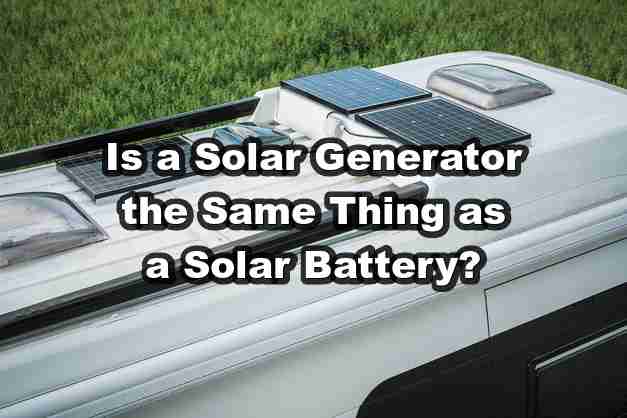Solar generators and solar batteries are distinct renewable energy technologies that serve fundamentally different purposes despite both harnessing the power of the sun.
When researching sustainable power solutions, understanding these differences is crucial for selecting the right option for your specific needs.
Solar generators combine multiple components into a single portable unit, while solar batteries are designed as permanent fixtures integrated with home electrical systems.
Your power requirements, installation capabilities, and mobility needs should guide your decision between these technologies. For those seeking flexibility and portability with minimal setup, solar generators provide an accessible entry point into renewable energy.
If you’re looking for whole-home backup power with significant capacity, solar batteries offer a comprehensive solution for long-term energy independence.
Key Takeaways
- Solar generators deliver portable power in a self-contained unit with 1,000-3,000 watts output, perfect for camping, emergencies, and mobile applications.
- Solar batteries provide fixed home integration with 5,000-10,000+ watts capacity, ideal for whole-home backup and daily energy management.
- Choose a solar generator for mobility and flexibility ($500-$5,000) with no installation required.
- Invest in a solar battery system ($7,000-$19,000 including installation) for comprehensive home power management and long-term value.
- Your specific power needs, budget constraints, and installation capabilities should determine which technology best serves your renewable energy goals.
Basic Definitions
A solar generator is a portable power station that combines several components into a single, transportable unit. These versatile devices are designed for mobility and convenience, making them ideal for various applications. To learn more about their uses, check out our guide on what a solar generator is used for.
Solar batteries, in contrast, are stationary energy storage systems specifically designed for permanent installation in homes or businesses. They integrate with rooftop solar panels and home electrical systems to provide consistent backup power and daily energy management.
Key Components
Solar generators pack multiple components into a compact package:
- Built-in inverter for converting DC to AC power
- Integrated battery storage
- Charge controller for managing power flow
- Multiple output ports for various devices
- Protective portable enclosure
Solar batteries focus on robust, fixed installation:
- High-capacity battery cells
- Grid-tie integration systems
- Home electrical system connections
- Professional installation hardware
- Advanced monitoring capabilities
Primary Differences
The most significant distinction between these technologies lies in their intended use and installation requirements. Solar generators prioritize portability and flexibility, while solar batteries emphasize permanent installation and whole-home power management.
Capacity also differs significantly. While solar generators typically offer limited power storage, solar batteries can be scaled to meet larger energy demands.
For perspective on longevity, read our article about how long solar generators last.
Use Cases
Solar generators excel in scenarios requiring mobility:
- Camping and outdoor recreation.
- Emergency backup power for essential devices.
- Construction site power needs.
- Mobile business operations.
Solar batteries are ideal for:
- Whole-home backup power systems.
- Daily solar energy storage.
- Grid-tied power management.
- Peak load shifting to reduce utility costs.
Our gas generator category provides additional alternatives for those considering traditional power options.
Performance Comparison
Performance varies significantly between these technologies:
Power Output
Solar generators typically provide 1,000-3,000 watts of power, suitable for small appliances and devices. Solar batteries can deliver 5,000-10,000 watts or more, capable of powering entire homes.
Storage Capacity
- Solar Generators: 500Wh to 2,000Wh typical capacity.
- Solar Batteries: 10kWh to 20kWh or more possible with modular systems.
Charging Options
Solar generators offer multiple charging methods:
- Solar panels.
- AC wall outlets.
- Car chargers.
- USB-C power delivery.
Solar batteries primarily charge through:
- Rooftop solar arrays.
- Grid power when available.
- Backup generators in some cases.
Cost Analysis
Initial investments vary significantly:
Solar Generators:
- $500-$3,000 for basic units.
- $3,000-$5,000 for premium models.
- No installation costs.
- Minimal maintenance expenses.
Solar Batteries:
- $5,000-$15,000 for the battery system.
- $2,000-$4,000 for professional installation.
- Potential tax incentives and rebates.
- Higher long-term value.
Making the Right Choice
Consider these factors when choosing between a solar generator and solar battery:
- Power Requirements: Calculate your essential power needs
- Installation Constraints: Consider available space and installation requirements
- Budget: Factor in both initial and long-term costs
- Future Needs: Plan for potential expansion
- Local Regulations: Check permitting requirements
Conclusion
Solar generators and solar batteries each fulfill distinct roles in the renewable energy landscape, with your specific needs determining which solution provides the greatest value.
Solar generators excel in providing portable, flexible power for outdoor activities, emergency preparedness, and temporary power needs without requiring professional installation or permanent modifications to your home. Solar batteries, with their significantly higher capacity and integration capabilities, deliver comprehensive energy management solutions for those committed to long-term energy independence.
When evaluating which technology best suits your situation, carefully assess your power requirements, budget limitations, and installation capabilities. If you value mobility and flexibility with a modest initial investment, solar generators provide an excellent entry point into renewable energy with their multiple charging options and versatile applications.
For those seeking to power an entire home, integrate with existing solar panel systems, and achieve greater energy resilience, a solar battery system represents a more comprehensive solution despite the higher upfront investment.
By choosing either technology, you’re taking a meaningful step toward sustainable energy use. Whether you need the portability of a solar generator for your next camping trip or the robust capacity of a solar battery for daily home energy management, both options contribute to reducing reliance on traditional power sources while providing the energy security you need.








Leave a Reply